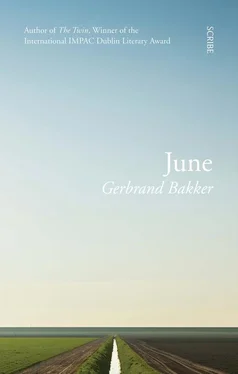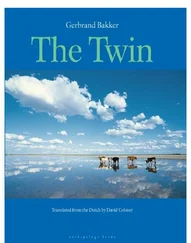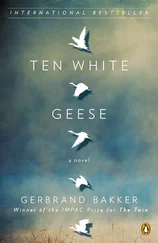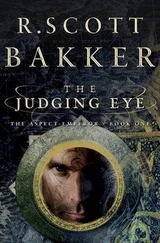Gerbrand Bakker was born in 1962. He studied Dutch language and literature and worked as a subtitler for nature films before becoming a gardener. Bakker won the 2010 International IMPAC Dublin Literary Award for his novel The Twin (Scribe, 2008) and the 2013 Independent Foreign Fiction Prize for his novel The Detour (Scribe, 2012).
‘We’re almost in Slootdorp,’ the driver says. ‘That’s where the next mayor takes over.’
She looks out. Fields stretching away in broad bands on either side. Squat farmhouses with red-tiled roofs. Thank goodness it’s not raining. Her view to the right is partly blocked by C. E. B. Röell, who is reading papers presumably related to their next destination. She takes off her gloves, lays them on her lap and flicks open the ashtray. Röell starts to huff. Ignore it. They’re not even halfway yet, but it already feels like they’ve been on the road for most of the day. Once she’s lit her cigarette and is drawing on it deeply, she sees the driver’s eyes shining in the rear-view mirror. She knows that he would love to light up too, and if Röell weren’t in the car, he would.
After a fairly early start in Soestdijk, the morning had been dedicated to the former island of Wieringen, where they made the unforgivable misjudgement of starting her itinerary by presenting her with a table covered with shrimp. At half past ten in the morning. Although the inappropriateness had actually begun even earlier, when the mayor had his own daughters present the flowers while his wife pretended she couldn’t see the little children standing on the dyke around the harbour. After that, more schoolchildren and old-age pensioners — the inevitable schoolchildren and old-age pensioners. Still, it’s just a Tuesday, a normal working day. In the town hall, a special council meeting was held in her honour. Most of the mayor’s speech passed her by, thinking ahead as she was to this evening and the Piet Hein , and when she took a distracted sip of her coffee it tasted more or less like the mayor’s words. The woman who had been commissioned to make a bronze bust of her was there too.
‘What was that nun’s name again?’ she asks.
‘Jezuolda Kwanten. Not a nun, a sister.’ Röell doesn’t look up, sticking doggedly to her reading. A brief summary will follow shortly.
Jezuolda Kwanten — of Tilburg — who had stared at her keenly for almost half an hour, occasionally sketching something on a large sheet of yellowish paper, thus making it even more difficult to follow the mayor’s lecture. She’s in the car behind hers, with Beelaerts van Blokland and Van der Hoeven. Couldn’t they have arranged that differently? she wonders. Röell in the second car and Van der Hoeven in hers? He’s a fellow smoker. Jezuolda Kwanten is going to be present at all of the festivities, the whole day long: looking at her, measuring her up, sketching her. Not just today, but tomorrow too. When even being photographed is something she detests. And all for the sake of ‘art’, which will turn her into a ‘bust’.
They drive into a village that is made up entirely of new houses. There are remarkably few people out on the streets and virtually no flags being waved.
‘Slootdorp,’ the driver says.
‘What’s his name?’ she asks.
‘Omta,’ says Röell.
A group of people are standing in front of a hotel called the Lely. A very small group. No schoolchildren and pensioners here, no flowers, pennants or shrimp. She gets out of the car and the man wearing the chain of office holds out his hand. ‘Welcome to Wieringermeer,’ he says.
‘Good morning, Mr Omta,’ she says.
‘You’re not stopping here at all,’ he says.
‘What a shame,’ she says.
‘I’ll drive ahead of you to the district boundary. This, by the way, is my wife.’
She shakes the mayoress’s hand and climbs back into the car. Now, that’s her kind of man. No moaning, no dawdling, no look in the eyes as if to say, ‘Why aren’t you spending hours here with us?’ Did he actually call her ‘Your Majesty’? Or even ‘Ma’am’? The mayoress hadn’t wasted any words either, she’d simply curtseyed. In any case, from what she’s seen of Wieringermeer so far, she’s glad she won’t have to spend hours here. If that’s even possible. Omta has climbed into a blue car and driven off slowly in front of her, leaving his wife behind, looking somewhat lost outside the hotel. The gusty June wind plays havoc with her hair while a flag flutters overhead.
‘… sixteen ten,’ Röell reads aloud. ‘The Polder House, where we have our lunch appointment, dates from sixteen twelve. Cattle breeding in particular is highly developed here. Pedigree cattle. Mention should be made of the well-known herd of Miss A. G. Groneman, whose late uncle — it said father, but that’s been crossed out and replaced with uncle — was made a Knight of the Order of Orange-Nassau for his many contributions in this field.’
‘Will she be at the lunch?’
Röell picks up another document and mumbles quietly. A wisp of grey hair peeks out from under her yellow pillbox hat. ‘Yes,’ she says, after a while.
‘That’s sure to be entertaining. Miss. Never married, in other words.’
Röell gives her a short sharp look.
‘Have a glass yourself sometime,’ she says. ‘Instead of looking at me like that.’ Outside there are still long bands of fields and squat farmhouses, each identical to the next. The sun is shining, it must be about twenty-two degrees. Perfect weather for getting in and out of cars without a coat. Not too hot, not too cold. ‘Besides,’ she adds, ‘I’m a great cow-lover.’
It will look like this here for months to come. Of course, the crops will grow and be harvested, but still. Early spring was and remains the most beautiful of the seasons. With different kinds of flowers coming up one after another in the palace gardens. Snowdrops around the beech trees, narcissus along the drive, snake’s head in the small round border near the goods entrance. And a little later, of course, the first sweet peas in the greenhouse. The moment the leaves appear on the trees it starts to get rather boring, especially now the girls aren’t running around on the lawn any more. Once the Parade has been and gone there isn’t much to it. Unmitigated tedium until the first shades of autumn. ‘Anything else of note?’
‘This almost entirely agricultural district has entered a difficult phase recently, especially economically.’
‘And why is that?’
‘Not only because of the poor climatic conditions of recent years, but also due to the fact that prices and wages have increased, while the yield from their produce has not risen proportionally.’
‘Oh, yes: prices, wages and yields. But everyone round here will still be out in their Sunday best when we arrive.’
‘It also says that approximately ninety per cent of local businessmen have renovated or modernised their premises. The population has come to realise that to mark time is to fall behind and that progress is essential. And it goes without saying that forward thinking is the key to good government.’
‘Absolutely. But they still said it.’
‘Ah… council officials.’
‘What do you mean by that?’
‘Nothing.’
‘I’m quite curious as to what they will be serving for lunch.’
‘Yes.’
No, she thinks, I definitely don’t want to suffer this again. This time I’ll say something. The Government Information Service doesn’t need to be present in the vehicle in the form of Röell. What on earth made them think I would prefer to travel in the same car as Röell rather than with Van der Hoeven? And perhaps Pappie would like to join me on a work trip again sometime soon.
Читать дальше












